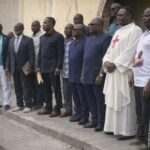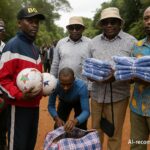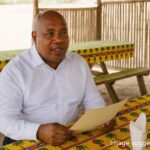Government assurance over party status
On 12 July in Brazzaville, Prefect and Director-General of Territorial Administration Bonsang Oko Letchaud held an unusually candid briefing aimed at leaders of roughly one hundred political organisations whose legal registration remains pending, a category often labelled in the Congolese debate as “non-recognised” parties.
- Government assurance over party status
- The six-month compliance deadline
- Legal basis and constitutional guarantees
- Opposition voices seek firm guarantees
- Administrative response and proposed pathway
- Regional context of party regulation
- Economic stakes of transparent party finance
- Looking ahead to 2026 elections
- International observation and diplomatic interest
Speaking before national and international media, the senior official stated that none of the formations had been suspended or dissolved, emphasising that they remain free to operate provided they complete administrative adjustments required under the 2017 Organic Law on party creation and financing.
The six-month compliance deadline
Letchaud recalled that on 4 March the Interior Ministry set a six-month window for all political entities to submit updated charters, audited accounts and membership lists, a move portrayed by authorities as a normalisation exercise designed to foster transparency and level the electoral playing field.
The deadline elapsed in early September without full compliance from certain groups. Consequently, a ministerial order listed those still awaiting recognition, triggering concerns that the catalogue might be construed internationally as a blacklist. Officials insist the document is purely administrative rather than punitive.
Legal basis and constitutional guarantees
Congo-Brazzaville’s Constitution enshrines multiparty democracy, and Law 20-2017 details organisational thresholds, public funding modalities and annual disclosure obligations. Jurists contacted by the Review underline that the statute resembles regulatory frameworks in Cameroon and Benin, though enforcement timelines vary across the region (Centre d’Etudes Stratégiques de l’Afrique).
Government lawyers argue that aligning domestic parties with financial accountability norms enhances credibility with partners such as the IMF, which has stressed governance benchmarks in its 2023 Article IV consultation. In their view, procedural clarity today could reduce litigation risks during the 2026 presidential cycle.
Opposition voices seek firm guarantees
Yet several party leaders interpret their temporary absence from the official roster as a political warning. “I was on the list in 2020, but disappeared this year; how is that not a sanction?” asked Maurice Kinoko of the Movement for Democracy and Change during the briefing.
Others described the ministerial order as “intellectual trickery”, contending that local prefects may cite it to ban rallies. They requested a clarifying circular guaranteeing freedom of assembly nationwide. Diplomats from the European Union and the United Nations Development Programme attended the meeting but declined to comment publicly.
Administrative response and proposed pathway
Letchaud responded that an inter-ministerial task force was already reviewing each file and could reintegrate compliant organisations within weeks, an assertion later echoed by Interior Minister Raymond Zéphirin Mboulou during an interview on national radio, who described the process as “technical housekeeping” rather than political vetting.
Analysts at the Brazzaville-based think tank CERAPE note that previous regularisation drives in 2014 and 2018 largely succeeded once clear guidance circulated to provincial administrations. They believe a similar memo today would lower tensions and allow parties to focus on policy formulation ahead of municipal polls.
Regional context of party regulation
Across Central Africa, interior ministries routinely update party registries to weed out dormant structures. Gabon reduced its roster from over 80 to 43 in 2021; Equatorial Guinea applies comparable financial criteria. Congolese officials argue their approach mirrors best practice rather than signalling a restrictive turn.
The African Union Charter on Democracy encourages states to ensure parties “comply with national legislation”. Regional political scientist Dr. Marvine Ndinga emphasises that compliance mechanisms must be accompanied by consistent communication to prevent suspicion, a lesson he says was learned during Cameroon’s similar audit in 2019 (Jeune Afrique).
Economic stakes of transparent party finance
Beyond legal formality, transparent party finance has macroeconomic echoes. The IMF’s Country Report 23/72 highlighted governance improvements as pivotal to maintaining the Extended Credit Facility. Demonstrating a consistent approach to all political actors may reassure budget support partners who seek assurance that funds are not diverted into opaque campaigns.
Congolese economist Nadine Okouba notes that political uncertainty can widen sovereign bond spreads. “A clear rulebook for parties is not simply democratic housekeeping; it supports investor confidence,” she told this magazine, pointing to the 2022 Eurobond issuance that referenced governance benchmarks in its prospectus.
Looking ahead to 2026 elections
With the presidential poll scheduled for July 2026, both recognised and provisional parties are stepping up grassroots outreach. The electoral commission has already begun biometric voter roll upgrades, while civic groups such as the Congolese Observatory of Human Rights plan parallel counts to bolster credibility of final tallies.
Whether the current regularisation debate evolves into a consensual roadmap will influence that contest’s tenor. For now, officials reiterate President Denis Sassou Nguesso’s longstanding message that “political pluralism is an asset, not a threat”. The coming weeks, rather than years, will test the administrative machinery behind that statement.
International observation and diplomatic interest
Foreign missions based in Brazzaville, including France, the United States and China, are monitoring the file because party access determines which interlocutors they cultivate. A senior Western diplomat privately welcomed the “measured tone” of Letchaud’s briefing, calling it a signal that institutional dialogue remains the government’s preferred instrument.






















